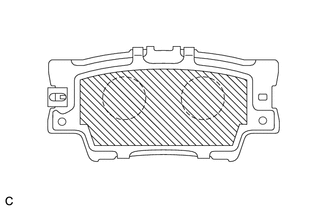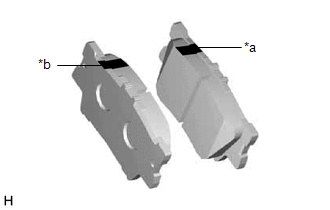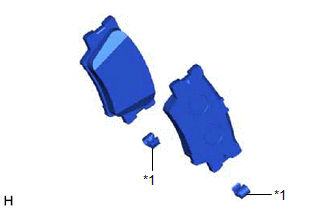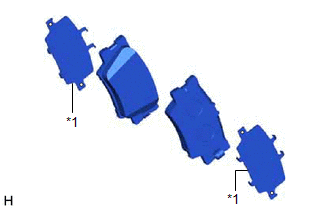Toyota Camry (XV70): Installation
INSTALLATION
CAUTION / NOTICE / HINT
NOTICE:
- Immediately after installing the brake pads, the braking performance may be reduced. Always perform a road test in a safe place while paying attention to the surroundings.
- After replacing the rear disc brake pads, the brake pedal may feel soft due to clearance between the rear disc brake pads and rear disc. Depress the brake pedal several times until the brake pedal feels firm.
- After replacing the rear disc brake pads, always perform a road test to check the braking performance and check for vibrations.
HINT:
- Use the same procedure for the RH side and LH side.
- The following procedure is for the LH side.
PROCEDURE
1. INSTALL REAR DISC BRAKE ANTI-SQUEAL SHIM KIT
NOTICE:
- When replacing a worn rear disc brake pad, the rear disc brake anti-squeal shim kit must be replaced together with the rear disc brake pad.
- Do not apply lubricants to the lining surface of the brake pad.
- Install the rear disc brake pad wear indicator plates in the correct position and direction.
| (a) Check the rear disc brake pad. HINT: If the rear disc brake pad has an identification mark, be sure to confirm the installation location. |
|
| (b) Install the rear disc brake pad wear indicator plate to each rear disc brake pad. |
|
(c) Apply brake shim grease (Part No. 08887-80409) to the back plate of the rear disc brake pads.

 |
Brake Shim Grease (Part No. 08887-80409) |
| (d) Install the rear No. 1 disc brake anti-squeal shim to each rear disc brake pad. |
|
2. INSTALL REAR DISC BRAKE PAD
CAUTION:
- Be careful not to get pinched by the rear disc brake cylinder assembly or other parts when installing the rear disc brake pads.
- After lifting up the rear disc brake cylinder assembly, secure it in place before performing any work on it.
.png)
- The rear disc brake cylinder assembly could fall, pinching hands or fingers and causing injury.
(a) Push in the rear disc brake piston.
NOTICE:
- Make sure the brake fluid does not overflow from the reservoir.
- Do not forcibly push in the rear disc brake piston.
(b) Install the 2 rear disc brake pads to the rear disc brake cylinder mounting.
NOTICE:
- Keep the friction surfaces of the rear disc brake pads and rear disc free from oil and grease.
- Install the rear disc brake pad so that the rear disc brake pad wear indicator plate is mounted on the lower side of the vehicle.
HINT:
If the rear disc brake pad has an identification mark, be sure to confirm the installation location.

|
*a | Inner Side (White) |
|
*b | Outer Side (Green) |
(c) Hold the rear disc brake cylinder slide pin (lower side) and install the rear disc brake cylinder assembly to the rear disc brake cylinder mounting with the bolt.
Torque:
26.5 N



